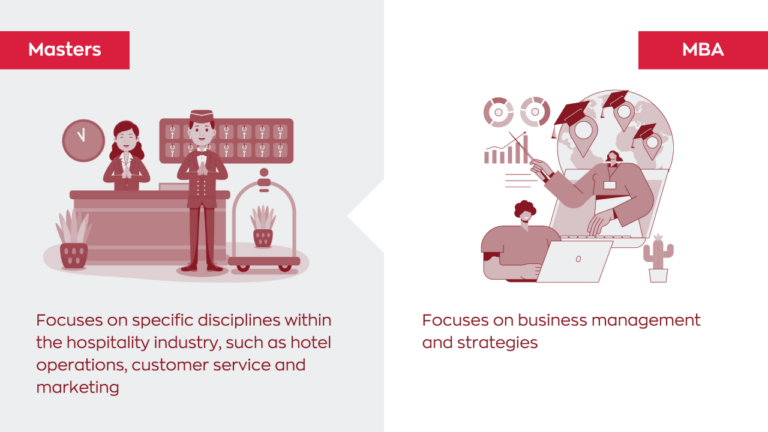Online MBA in Global Hospitality Management
Online MBA in global hospitality management programs offer a unique blend of academic rigor and practical application, preparing graduates for leadership roles in a dynamic and ever-evolving industry. These programs provide a flexible and accessible pathway to a rewarding career, combining core business principles with specialized knowledge in the hospitality sector. The curriculum typically includes courses in areas such as strategic management, financial accounting, marketing, and operations management, often tailored to address the specific challenges and opportunities within the global hospitality landscape.
This comprehensive approach equips graduates with the skills and knowledge necessary to excel in a competitive international market.
Students benefit from a variety of learning resources, including online libraries, virtual simulations, and case studies drawn from real-world hospitality scenarios. The online format allows for a personalized learning experience, catering to diverse learning styles and schedules. Furthermore, many programs prioritize networking opportunities, connecting students with industry professionals and alumni through online forums, virtual events, and mentorship programs.
The result is a robust education that prepares graduates for successful careers in a wide range of hospitality settings, from luxury hotels to international resorts to innovative hospitality technology companies.
Program Overview: Online MBA In Global Hospitality Management

An Online MBA in Global Hospitality Management provides a comprehensive education in business administration tailored to the specific demands of the global hospitality industry. This program equips students with the theoretical knowledge and practical skills necessary to succeed in leadership roles within hotels, resorts, restaurants, cruise lines, and other hospitality-related businesses worldwide.
Curriculum Details
A typical online MBA in Global Hospitality Management curriculum includes a blend of core business courses and specialized hospitality management electives. Core courses typically cover areas such as financial accounting, managerial economics, marketing management, operations management, and strategic management. These foundational courses provide a solid understanding of general business principles. Specialization options might include revenue management, hospitality marketing and branding, food and beverage management, human resource management in hospitality, sustainable tourism, and digital hospitality.
The specific electives offered will vary depending on the institution.
Admission Requirements
Admission requirements for online MBA programs in Global Hospitality Management are generally similar to those for traditional on-campus programs. Applicants typically need a bachelor’s degree from an accredited institution, a minimum GPA (often 3.0 or higher), and GMAT or GRE scores (specific score requirements vary by program). Significant work experience, particularly within the hospitality industry, is often a significant factor in the admission decision.
Some programs may also require letters of recommendation and a personal statement outlining the applicant’s career goals and aspirations.
Online versus On-Campus Learning Experience
While both online and on-campus MBA programs in Global Hospitality Management provide a strong business education, they differ in their delivery and learning environment. Online programs offer flexibility and convenience, allowing students to study at their own pace and location. This is particularly beneficial for working professionals who may not have the time or resources to attend traditional classes.
On-campus programs, on the other hand, provide a more immersive and interactive learning experience, fostering collaboration and networking opportunities with peers and faculty. The choice between online and on-campus learning depends on individual learning styles, career goals, and personal circumstances.
Benefits of an Online MBA in Global Hospitality Management
| Benefit | Description | Target Audience | Example |
|---|---|---|---|
| Flexibility and Convenience | Study anytime, anywhere, accommodating busy schedules and diverse geographical locations. | Working professionals, individuals with family commitments, international students. | A hotel manager can pursue an MBA while continuing their current role, improving their skills and career prospects. |
| Affordability | Potentially lower costs compared to on-campus programs due to reduced travel and accommodation expenses. | Students with limited financial resources, individuals seeking a cost-effective path to career advancement. | A student can avoid relocation costs and save on living expenses by studying online. |
| Accessibility | Access to a wider range of programs and institutions, irrespective of geographical location. | Individuals in remote areas, international students without visa restrictions for on-campus study. | A student in a rural area can access a top-tier hospitality management program without relocating. |
| Networking Opportunities | Online programs often provide opportunities for networking through online forums, group projects, and virtual events. | Students seeking professional connections and career advancement within the hospitality industry. | Participation in online discussion forums allows students to connect with professionals from different parts of the world. |
Program Accreditation and Recognition
Choosing an online MBA program, especially in a specialized field like Global Hospitality Management, requires careful consideration of its accreditation status. Accreditation signifies that the program meets specific quality standards and provides assurance to prospective students regarding the program’s rigor, credibility, and value in the job market. This section will explore the importance of accreditation, the benefits of choosing an accredited program, and will provide a comparative overview of the accreditation held by some leading online MBA programs.Accreditation for online MBA programs in Global Hospitality Management ensures a consistent level of quality and relevance.
Reputable accrediting bodies rigorously evaluate programs based on factors such as curriculum design, faculty qualifications, learning resources, student support services, and overall program effectiveness. This rigorous process helps maintain high educational standards and contributes to the overall value and recognition of the degree in the industry.
Benefits of Accreditation from Reputable Organizations
Accreditation from respected organizations offers numerous benefits to students. Graduates from accredited programs often enjoy enhanced career prospects, as employers often prioritize candidates with degrees from accredited institutions. Furthermore, accreditation can increase the likelihood of acceptance into doctoral programs or other advanced studies. Finally, accreditation can enhance the overall credibility and recognition of the degree, leading to greater professional opportunities and potential higher earning power.
The value of an accredited degree extends beyond immediate employment, providing a foundation for long-term career growth and advancement within the global hospitality industry.
Accreditation Status Comparison of Leading Online MBA Programs, Online MBA in global hospitality management
Direct comparison of the accreditation status of various online MBA programs requires accessing the most up-to-date information from each program’s official website. Accreditation bodies and their standards can change, therefore, relying on current, official sources is crucial. For example, one program might hold accreditation from AACSB International (Association to Advance Collegiate Schools of Business), while another might be accredited by ACBSP (Accreditation Council for Business Schools and Programs).
Each body has its own rigorous standards, but both generally signify a commitment to high-quality business education. To make an informed decision, prospective students should independently verify the accreditation status of any program they are considering.
Common Accreditation Bodies for Hospitality Management Programs
A list of accreditation bodies frequently associated with high-quality hospitality management programs provides a benchmark for evaluating potential programs. These organizations represent a commitment to excellence and provide assurance of a rigorous and relevant education. Note that the presence of accreditation does not automatically guarantee a perfect fit for every individual, but it does provide a crucial element of quality assurance.
- AACSB International (Association to Advance Collegiate Schools of Business): A globally recognized accrediting body for business programs, including those with a hospitality management focus.
- ACBSP (Accreditation Council for Business Schools and Programs): Another prominent accrediting body for business programs, known for its focus on teaching excellence and student learning outcomes.
- CHEA (Council for Higher Education Accreditation): While not a direct accreditor of specific programs, CHEA recognition signifies that an accrediting body itself meets rigorous quality standards.
Technological Aspects and Learning Resources
Our online MBA in Global Hospitality Management leverages cutting-edge technology to deliver a dynamic and engaging learning experience. We understand the importance of accessibility and flexibility, ensuring our platform is user-friendly and compatible with various devices. The program utilizes a blended approach, combining synchronous and asynchronous learning methods to cater to diverse student schedules and learning styles.This program utilizes a robust Learning Management System (LMS) that serves as the central hub for all course materials, communication, and assessments.
Students access lectures, readings, assignments, and interact with instructors and peers through this platform. The LMS provides a seamless integration of various technological tools designed to enhance the learning process.
Technological Tools and Platforms
The program utilizes a sophisticated Learning Management System (LMS), such as Moodle or Canvas, providing a centralized platform for course content, communication, and assessment. Video conferencing tools like Zoom or Microsoft Teams facilitate live lectures, interactive sessions, and virtual group projects. Collaboration tools such as Google Workspace or Microsoft 365 enable seamless teamwork and document sharing. Specialized hospitality management software may also be integrated to provide hands-on experience with industry-standard tools.
Furthermore, access to industry-relevant databases and research platforms is provided to support research and assignment completion.
Learning Resources Available to Students
A comprehensive online library provides access to a vast collection of academic journals, ebooks, and industry reports relevant to global hospitality management. Virtual labs simulate real-world scenarios, allowing students to practice their skills in a safe and controlled environment. These simulations might involve managing hotel operations, developing marketing strategies, or handling crisis situations. The program incorporates a wide range of case studies, drawn from both established and emerging hospitality businesses, to illustrate key concepts and problem-solving techniques.
These case studies offer practical, real-world examples that challenge students to apply their knowledge in diverse contexts. Access to industry experts through webinars and guest lectures provides valuable insights and networking opportunities.
Online Assessment and Feedback Mechanisms
Online assessments are conducted through a variety of methods, including quizzes, assignments, projects, and exams. These assessments are designed to measure student understanding of key concepts and their ability to apply them to practical situations. Automated grading tools are used for objective assessments, while subjective assignments receive detailed feedback from instructors. The LMS facilitates timely submission and feedback, ensuring students receive prompt guidance and support.
Peer review mechanisms are also incorporated in some assignments, fostering collaborative learning and enhancing critical thinking skills.
Technology’s Enhancement of the Learning Experience
The integration of technology significantly enhances the learning experience. For example, virtual reality (VR) simulations can immerse students in realistic hospitality environments, allowing them to practice customer service interactions, manage hotel operations, or even design event spaces.
“Using VR, students can experience the challenges of managing a busy hotel lobby during peak season, responding to customer requests in real-time, and making quick, effective decisions under pressure – all within a safe, controlled virtual environment. This immersive experience provides invaluable practical training that is difficult to replicate in a traditional classroom setting.”
Flexibility and Program Structure

Our Online MBA in Global Hospitality Management is designed to accommodate the diverse needs and schedules of our students. We understand that pursuing an advanced degree while maintaining professional commitments requires a flexible and adaptable learning environment. This program offers various options to ensure a personalized learning experience that fits your lifestyle.
The flexibility offered by our online program extends to both scheduling and learning pace. Unlike traditional, in-person programs that require fixed class times and attendance, our online format allows students to access course materials and complete assignments at their convenience, within established deadlines. This asynchronous learning model empowers students to manage their studies around existing work schedules, family obligations, and other commitments.
Students can work through the material at their own speed, revisiting concepts as needed and progressing at a pace that aligns with their individual learning styles and time availability.
Program Structure Options
Our program offers different structural approaches to cater to various learning preferences. A cohort-based structure, for instance, involves a group of students progressing through the curriculum together, fostering a sense of community and collaboration. This structure often includes scheduled online sessions, discussions, and group projects, creating a more interactive learning experience. Alternatively, a self-paced structure provides students with greater autonomy, allowing them to complete coursework at their own pace within established deadlines.
This option is particularly beneficial for students with unpredictable schedules or those who prefer a more independent learning style. Both structures are designed to provide a rigorous and comprehensive education.
Time Commitment Comparison
The time commitment for our online MBA program is comparable to that of a traditional program, though the distribution of that time differs significantly. While a traditional program might require several hours of on-campus attendance per week, our online program distributes this time across independent study, online discussions, and project work, allowing students to manage their workload more effectively. The total hours of study required per week are generally similar, but the flexibility of the online format allows for better management and integration with other commitments.
For example, a student might dedicate two hours each evening to studying, rather than needing to attend a three-hour class on campus.
Advantages and Disadvantages of Online Learning for an MBA in Global Hospitality Management
| Advantages | Disadvantages | Advantages | Disadvantages |
|---|---|---|---|
| Flexibility in scheduling and location | Requires self-discipline and time management skills | Access to a wider range of resources and perspectives | Reduced opportunities for in-person networking and collaboration (though often mitigated by online platforms) |
| Cost-effectiveness (reduced travel and accommodation expenses) | Potential for technological issues and internet connectivity problems | Potentially faster completion time due to flexible scheduling | May require a higher level of self-motivation and independent learning skills |
Networking and Industry Connections
Pursuing an online MBA in Global Hospitality Management offers unique opportunities to build a robust professional network, extending far beyond the limitations of a traditional classroom setting. The virtual environment, while seemingly isolating, actually facilitates connections with a diverse range of individuals across geographical boundaries and career stages, fostering collaborations and knowledge sharing that significantly enhance career prospects.Successful online programs understand the critical role networking plays in career advancement and actively incorporate strategies to cultivate meaningful connections for their students.
These strategies go beyond simple online forums and actively integrate students into the broader hospitality industry.
Methods for Facilitating Networking
Many online MBA programs in Global Hospitality Management employ a variety of methods to foster networking among students and with industry professionals. These methods are designed to replicate and even enhance the networking experiences found in traditional programs, leveraging the advantages of online platforms. For example, dedicated online forums provide a space for students to connect, discuss industry trends, and collaborate on projects.
These platforms often include features that facilitate group work and the sharing of resources. Furthermore, many programs organize virtual networking events, bringing together students, alumni, and industry professionals for interactive sessions and presentations. These events can include workshops, guest speaker sessions, and virtual career fairs. Finally, mentorship programs pair students with experienced professionals in the hospitality industry, providing guidance and career advice, along with valuable networking opportunities.
Connecting Students with Employers and Industry Professionals
Online MBA programs actively connect students with potential employers and industry professionals through several key initiatives. Career services departments often provide resources such as resume and cover letter workshops, interview preparation sessions, and job postings specifically tailored to the hospitality sector. These programs also frequently invite recruiters from leading hospitality companies to participate in virtual career fairs and networking events.
The alumni network also plays a vital role, with graduates often participating in mentorship programs or providing career advice to current students. The program’s strong ties with industry organizations and professional associations further enhance the opportunities for student-employer connections. Many programs also facilitate internships and other experiential learning opportunities, giving students real-world experience and exposure to potential employers.
Networking Strategies Employed by Successful Online MBA Programs
Successful online MBA programs in Global Hospitality Management employ several key networking strategies to maximize student engagement and career outcomes. These strategies are carefully designed to foster a sense of community and provide students with meaningful connections.
- Dedicated Online Platforms: These platforms are more than just discussion boards; they include features like project collaboration tools, professional profiles, and alumni directories, facilitating ongoing communication and interaction.
- Regular Virtual Networking Events: These events are not infrequent occurrences but are integrated throughout the program’s duration, providing consistent opportunities for students to connect with peers and industry professionals.
- Structured Mentorship Programs: These programs are not merely optional; they are often a core component of the curriculum, ensuring that every student benefits from the guidance and networking opportunities provided by a mentor.
- Industry Guest Speakers and Workshops: Programs invite a diverse range of speakers from various segments of the hospitality industry, offering students exposure to different career paths and potential employers.
- Strong Alumni Network Engagement: Programs actively foster relationships with alumni, leveraging their expertise and network to benefit current students through mentorship, career advice, and networking events.
- Integration with Industry Associations: Programs build strong relationships with relevant professional organizations, providing students with access to industry resources, networking events, and job opportunities.
Final Summary

In conclusion, pursuing an Online MBA in Global Hospitality Management presents a compelling opportunity for professionals seeking to advance their careers in the hospitality industry. The flexibility, accessibility, and comprehensive curriculum offered by these programs provide a valuable pathway to leadership roles in a dynamic and globalized market. The combination of theoretical knowledge and practical application, coupled with robust networking opportunities, empowers graduates to navigate the complexities of the hospitality sector and make a significant impact on the industry’s future.
The strategic blend of online learning and industry connections ensures graduates are well-prepared to thrive in this exciting and ever-evolving field.
Expert Answers
What are the typical prerequisites for an online MBA in Global Hospitality Management?
Prerequisites vary by program but generally include a bachelor’s degree, a competitive GMAT or GRE score, and several years of professional experience, often in the hospitality industry. Some programs may also require letters of recommendation and a statement of purpose.
How long does it typically take to complete an online MBA in Global Hospitality Management?
Completion time depends on the program structure and the student’s pace. Many programs can be completed in 18-24 months, though some offer accelerated or part-time options.
Are there any scholarships or financial aid options available for online MBA programs?
Many institutions offering online MBAs provide various scholarships and financial aid opportunities. It’s recommended to check directly with the program for available options and application processes.
What is the difference between a cohort-based and self-paced online MBA program?
Cohort-based programs involve a group of students progressing through the curriculum together, fostering collaboration. Self-paced programs allow students to learn at their own speed and schedule.
What career opportunities are available after completing an online MBA in Global Hospitality Management besides hotel management?
Graduates can pursue diverse roles, including revenue management, event planning, hospitality consulting, tourism management, and even entrepreneurial ventures within the hospitality technology sector.





